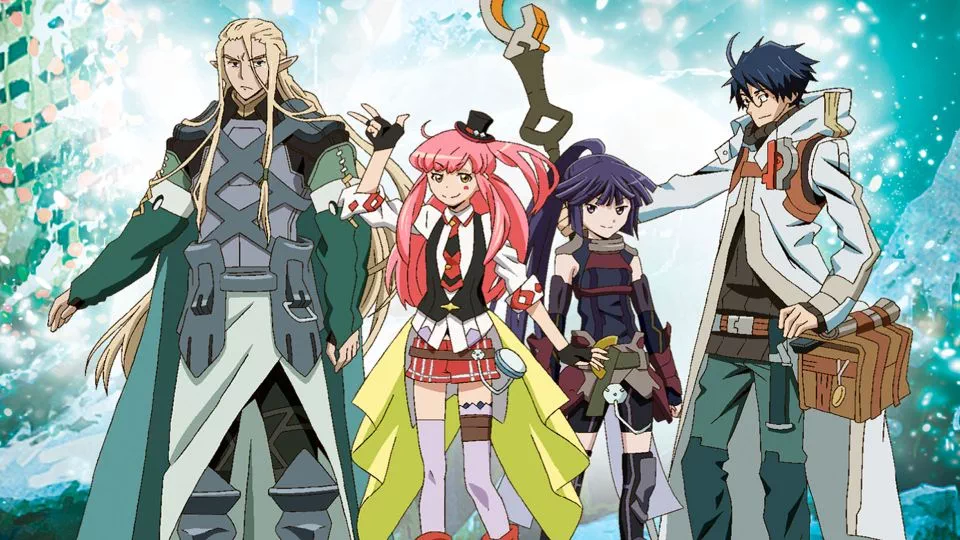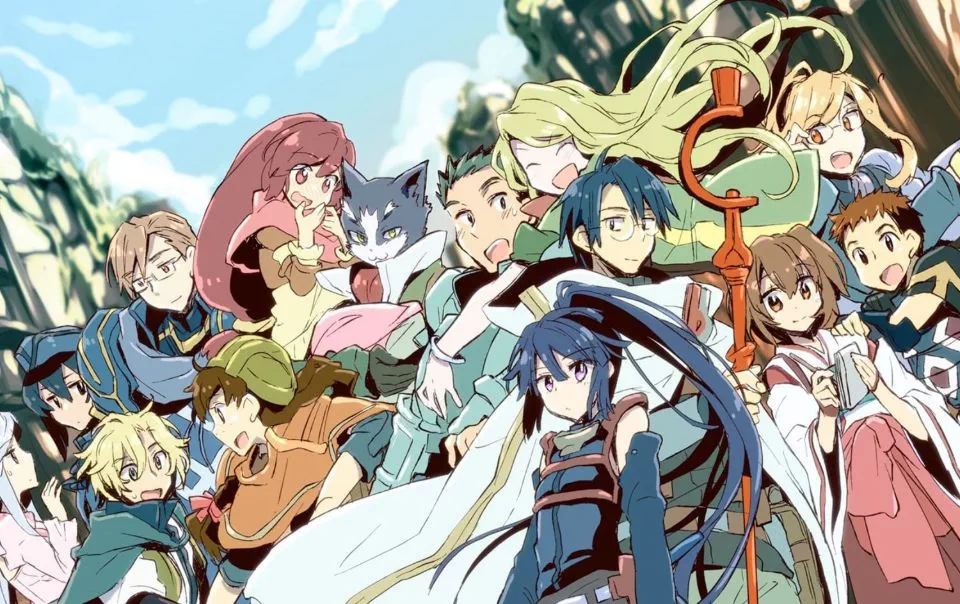Death Parade - TV Series Re...
I’d heard of Death Parade quite a bit before...
By Adonis Monahan3382

0

Introduction
When I finished watching Log Horizon I pretty much decided on how I felt about it in general: it had its own unique brand of issues and possible improvements but was satisfying to watch and enjoy overall.
I was pretty excited to watch the sequel, which I did soon after finishing the original, and to be frank, I was let down quite a bit.
It’s not bad per se, and it's quite good on average, but how I felt about it shifted quite dramatically from one episode to the other, to the point that I almost dropped the show completely, and held it on a near-hiatus for almost two weeks.
Unlike the original, Log Horizon 2 was made by Studio Deen (creators of fan-favorites like KonoSuba! and Fate/stay night). The second season was released about a year after the original, and aired from October 2014 to March 2015.
Its rating is about half a point lower than its predecessor on MyAnimeList.com, at a 7.64, as opposed to the 8.04 that the original has, and to be honest, I think that this rating fits well with my own experience.
Content
During my review of the first season, I commented on how I felt that the events in Log Horizon had little direction and most of the latter half of the season felt like the characters running around finding things to do for themselves.
The second season continues to do that in a similar fashion. As well as I could figure, the anime is split into four main arcs: the Abyssal Shaft raid, the Akihabara Murderer, the Log Horizon Youth Party Magic Bag Adventure, and the one with real progress, the raid on the Shibuya TV station.
Three of these are alright as subject matters, the Abyssal Shaft Raid is interesting enough and presents enough of a challenge to Shiroe that I was engaged in the battle and the dynamics of Shiroe’s relationship with the Silver Sword guild, Demikas, and the actual mechanics of a large scale raid battle.
The Akihabara Murderer arc was less interesting, but seeing Akatsuki in action on her own was fun in its own way, and the Shibuya TV Station Raid was the first sign of actual progress in finding a way out of the new world the adventurers found themselves in.
Plus, the pacing was quite fast, so I was more than satisfied with how Shiroe and his companions dealt with the moth monsters.
The one arc I skipped over was the one I’d called the “Log Horizon Youth Party Magic Bag Adventure” arc. Why? Because this arc was the reason why I almost discarded this anime completely.
In this arc, the younger members of Log Horizon, namely Rudy, Tohya, Minori, Isuzu, and Serara from the Crescent Moon Alliance, are all given a quest from the senior members of Log Horizon to travel to a far off city, hunt a wyvern, and collect the necessary materials to make magic bags -the undetectably extended storage backpacks that most senior players have.
Last season, I noted that the arc where this same party of characters gets to know each other and learn to fight in a group was my favorite part, and honestly, I still think the revival of Rudy as an adventurer by Shiroe through contract magic was an inspired piece of writing.
Unfortunately, this season’s arc was downright terrible. The pacing is incredibly slow, and Isuzu’s obsession with playing music and spreading it to the People of the Land, while interesting conceptually, was poorly executed.
To clarify, I felt like most of the arc was just a huge waste of time, with the characters dragging their wagon around, looking at uninteresting things. Hearing Isuzu perform the ending theme from the first season during the beginning of the arc was a pleasant surprise at the beginning, but it got old fast.
Put simply, the lack of consequence for the adventure had me feeling bored throughout the entire thing. Add to that the show trying to introduce the Western player nation’s attempted war and Nyanta’s interference just made it incredibly confusing, which I will touch on later when discussing the characters.
While this arc is definitely lower in quality than some of the other “casual” arcs that the first season (and the second) explored, the real issue with this arc is an issue with the anime overall, including the first season.
My biggest issue with Log Horizon overall is its failure to introduce and properly discuss events and mechanics of relevance in a satisfying way. At the end of the first season, I was upset with how little the characters seemed interested in going home, in the lack of attention given to revival and death, and the times when Shiroe did discuss these I always felt unsatisfied with the apparent consequences.
We can build a steam engine! What now? Alright, when adventurers die, they’ll lose part of their memories, but what are the consequences? We don’t see anyone suffering from this too badly, so it's pretty much irrelevant.
No one really wants to go home, so it doesn’t really matter. By the end of the first season I kind of pushed past that and didn’t really think much of it, assuming that it was just how Log Horizon wanted to tackle those elements and didn’t really want to push the plot in that kind of direction, but the second season kept repeating the same mistakes!
Shiroe spends the entirety of the first arc conquering the source of all gold in Elder Tale and he uses that power to buy all the land in Yamato and redistribute it among all the players.
Fine, that sounds good, but was there a problem in the first place? As far as I could tell, the show didn’t really make it clear that any players really had any issues with buying land or hunting wherever they wanted.
After Shiroe does this, there’s no real change in how things seem to be either. Life just seemed to go on normally. If Shiroe had never announced at the beginning of the arc that the Round Table was running out of money to run the Guild Hall, the entire raid would have been pointless.
The Akihabara Murderer arc has a similar problem. To shut him down, Akatsuki had to learn a “Teaching” (again, little to no elaboration as to what they are or what their purpose is) and negotiate with the Kunie clan (also highly undervalued; why has no one questioned their existence prior to this point?) to shut down Akihabara’s magic circle, the one powering the murderer’s armor.
Great, will we be seeing a full-on monster invasion of Akihabara or a massive wave of player-killing? Nope. Nothing happens. No consequences. A lot of what I’d convinced myself was irrelevant due to lack of attention in the first season was brought up again in the second season, as though the characters were waking up and realizing that these were important topics to consider, namely the death issue.
Shiroe faces death for the first time and fails to look past it and consider all the possibilities. Too much is accidentally left vague in Log Horizon, which often left me frustrated and annoyed at what the characters were doing.
 https://revyou.com/uploads/thumbnail-960/1592330939476Log-Horizon-Season-3.webp
Log Horizon Season 2 - TV Series Review
https://revyou.com/uploads/thumbnail-960/1592330939476Log-Horizon-Season-3.webp
Log Horizon Season 2 - TV Series Review
That’s not to say that all the content was bad. Introducing the “Navigators”, while definitely belated, definitely gave the show somewhere to go, with a goal finally appearing that Shiroe and the gang could work towards, contacting the Observers all the way on the moon, and I definitely got an exciting thrill when Shiroe revealed the exact identity of Roe 2 and why she looked so similar to him.
I’m very much interested to see where the plot will go from here, as long as they fix their character problems.
Characters
Or, to be more specific, character interaction problems. I felt like most of the main characters from the first season, Shiroe, Akatsuki, Naotsugu, and most of the other Log Horizon members, were more fun to watch, with all their positions clearer and their relationships better established.
A few of the characters that were introduced were also fun to watch and interact with, like the unexpected return of Demikas, William Massachusetts (the leader of the Silver Sword guild) and Roe 2, but most of the other characters felt either uninteresting or too bland to remember.
The show kept trying to introduce me to new characters or assumed I knew who was who better than I did exactly. Even worse, on occasion, the show would try to make me feel bad for certain characters when I barely knew who they were, and all I wanted was to get back to watching Shiroe smart-guy his way out of a triple-raid boss encounter.
In fact, Episode 10, in its entirety is a monologue by William Massachusetts telling his guild not to give up on the raid they just all died in.
William is one of the few new characters that I like, but I am in no way invested enough in William’s character to spend an entire episode with him as he remembers his history with Elder Tale and his status as a reject of society when I don’t even know the main character’s relationship to the game as well.
This doesn’t compare, however, to the “Log Horizon Youth Party Magic Bag Adventure” arc’s character problems. Around the mid-point of the season, we start getting more and more moments where the animation just stops and we look at characters looking at each other and saying each others’ names, while possibly crying.
Usually Isuzu. And yes, I get it, this is anime, and drama has to happen, but pausing the action and interrupting the flow of a quest multiple times over the same point, especially when its irrational is frustrating enough to make me pull out my hair.
Isuzu wants to become a musician, fine, but why is she crying because the People of the Land only have forty-two songs? It happens even more with the members of Plant Hayden, which the show seems to assume that I know and understand as it tries to make me feel sorry for or sympathetic towards their leader, Nureha (whose name has actually escaped me up until I looked it up just now).
These characters aren’t necessarily bad, and a large cast can often give an anime a lot of opportunities to explore different relationships and dynamics, but you absolutely cannot rush things without expecting me to lose track and get frustrated when I fall behind.
Log Horizon definitely rushed a lot of its characters, and without that build-up to get attached to the characters involved, it’s really hard for any viewer to get invested and emotionally affected by angst-driven scenes regardless of how good or logical they would be.
Art, Animation, and Sound
Everything here lies pretty close to the original. My biggest complaint with regard to the soundtrack was the opening theme.
With a banger like a Database as the opening for the first season and no second opening for the second chord, I was desperately holding out for another epic theme for the second season, to the point that I actually opened the first episode before I was planning on actually watching it, only to be disappointedly met with Database once again.
The ending theme isn’t bad, pretty much on par with Your Song* from the first season, and the OST is pretty similar to the first season’s (if not the exact same). My only problem was with the track reserved for “emotionally intense scenes”.
After a certain point, I visibly cringed when I heard the track’s opening, only because I knew what would follow was another five minutes of unnecessary, unashamed, useless heart-string tugging interrupting the epic fight scene I was so invested in.
As for the art and animation, it might just be me getting used to the art over time, but I definitely have any issues this time with art or animation. All the characters felt like they had just the right amount of color and saturation, and the designs felt creative enough to be unique without becoming jarring or disrupting the atmosphere. A well-balanced art scheme overall.
Conclusion
I have definitely seen worse anime. The second season of Log Horizon definitely had a lot of issues, more so than the original, but it continued to do some of the things it did well consistently.
I’m not sure whether we can expect the same quality from the third season, which should be released sometime during 2020, but I can certainly hope that the Navigators arc introduced at the end of the season should at least give Shiroe and the more fun characters some more playtime, as well as streamline the plot with a tangible objective.
This season definitely rushed the introduction of a lot of characters and failed to give us decent consequences or results from the many mechanics and situations the characters discovered, but this rush hopefully indicates a lack of rushing and a better foundation for a third season than more rushing in the future.
Updated 4 years ago